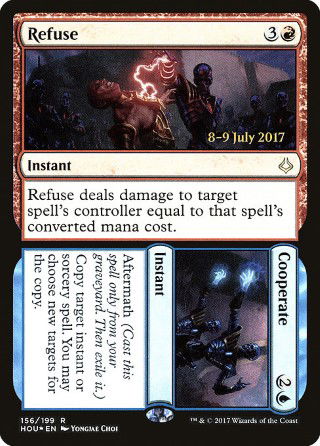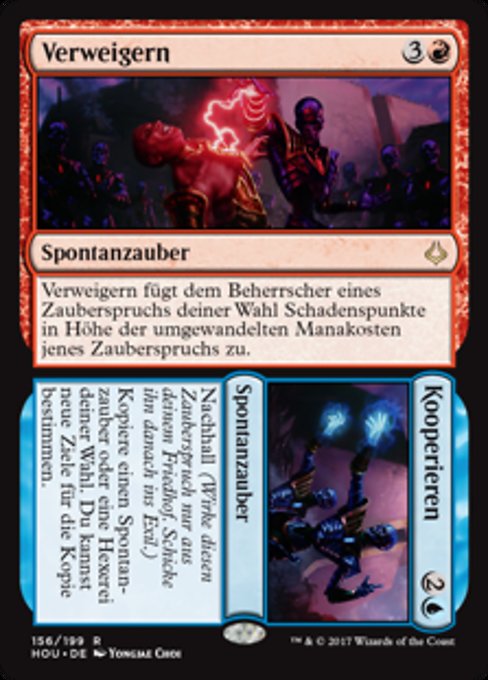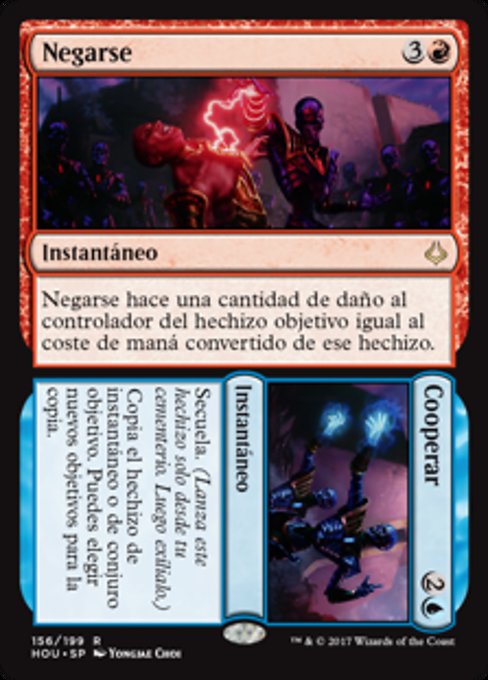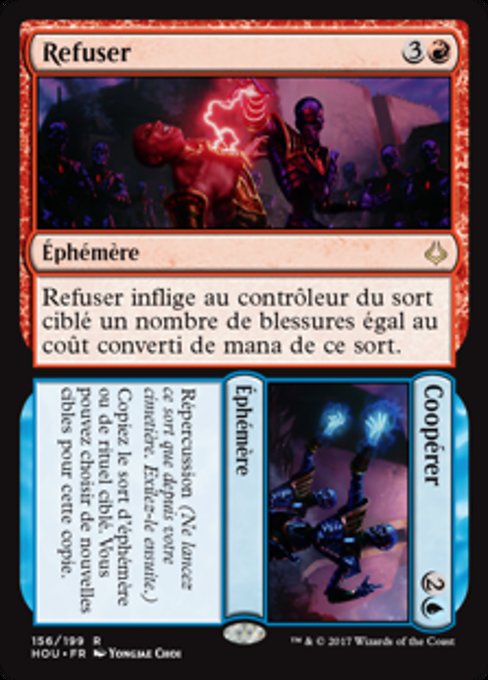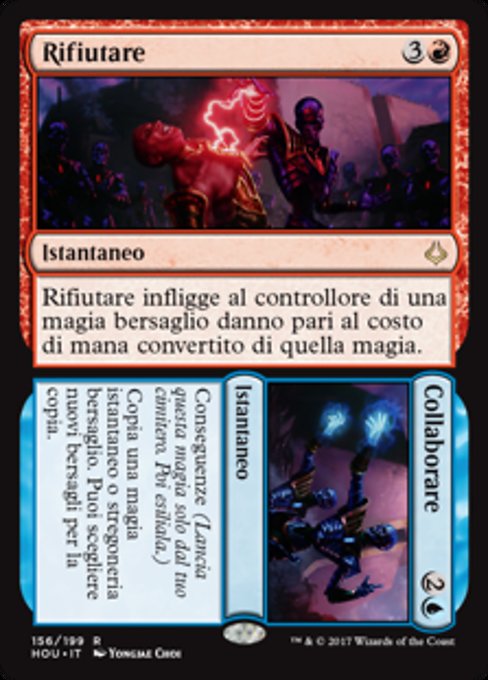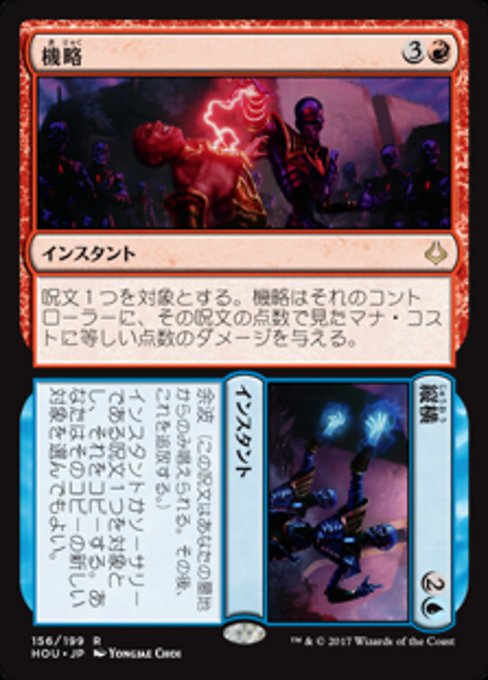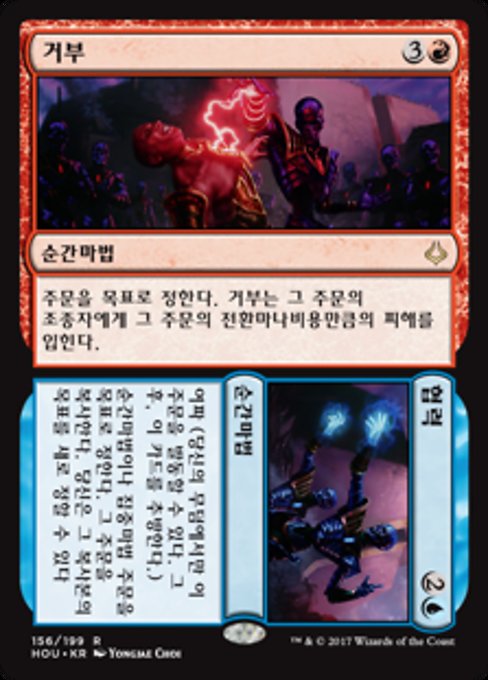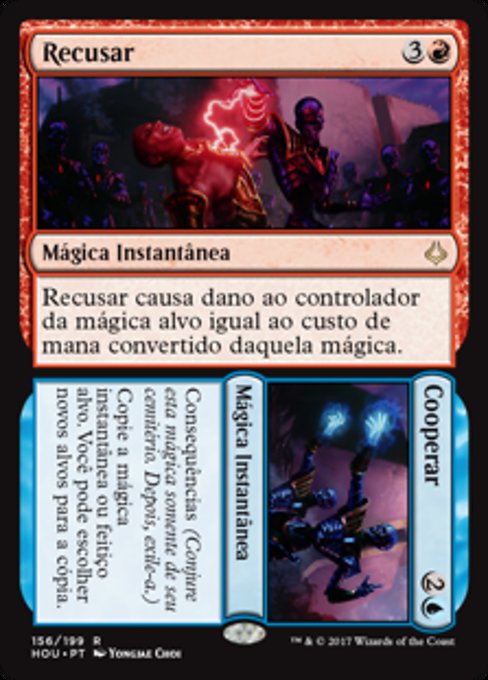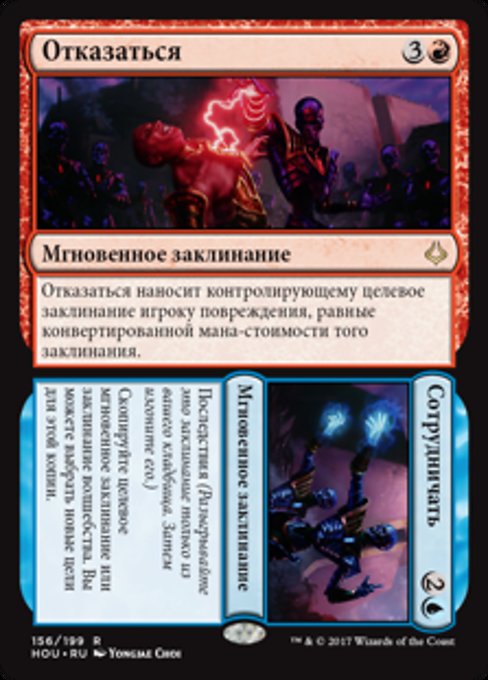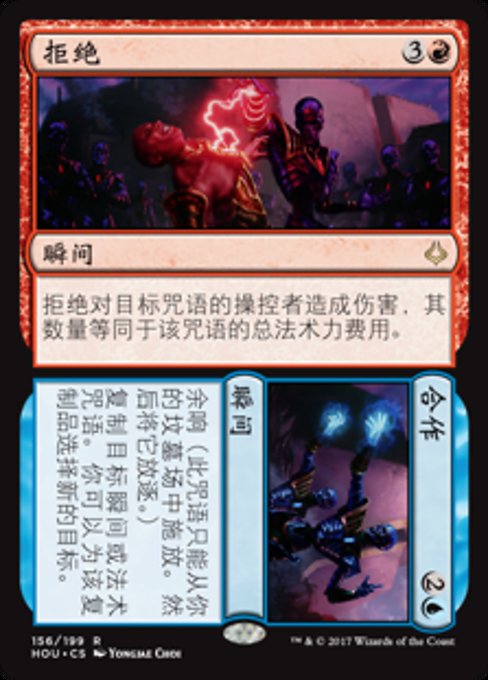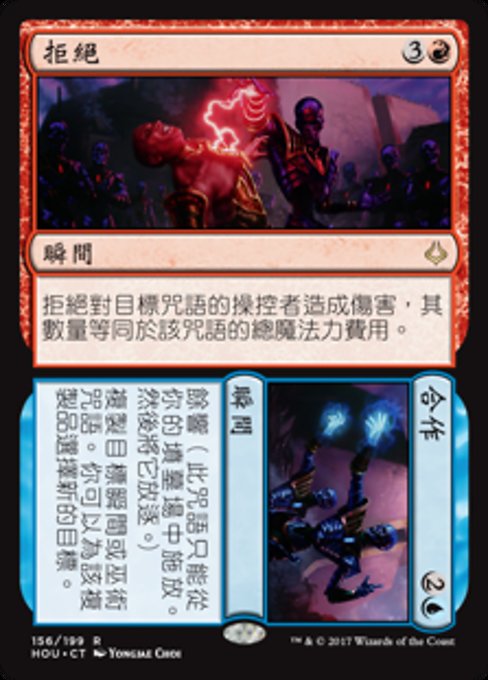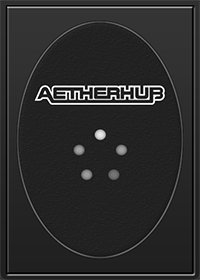
Cooperate
Instant
Aftermath (Cast this spell only from your graveyard. Then exile it.)
Copy target instant or sorcery spell. You may choose new targets for the copy.
|
Hour of Devastation (HOU)
#156b, Rare |
Illustrated by: Yongjae Choi
Multiverse ID: 430845
Not Legal Alchemy BO1
Not Legal Standard BO1
Not Legal Pauper
Not Legal Traditional Standard
Not Legal Traditional Alchemy
Rulings
- 2017-06-27
Cooperate can copy any instant or sorcery spell, not just one with targets. - 2017-06-27
The copy is created on the stack, so it's not "cast." Abilities that trigger when a player casts a spell won't trigger. - 2017-06-27
If you copy a spell, you control the copy. It will resolve before the original spell does. - 2017-06-27
The copy will have the same targets as the spell it's copying unless you choose new ones. You may change any number of the targets, including all of them or none of them. If, for one of the targets, you can't choose a new legal target, then it remains unchanged (even if the current target is illegal). - 2017-06-27
If the spell that's copied is modal (that is, it says "Choose one —" or the like), the copy will have the same mode. A different mode can't be chosen. - 2017-06-27
If the spell that's copied has an X whose value was determined as it was cast (like Torment of Hailfire does), the copy will have the same value of X. - 2017-06-27
If the spell has damage divided as it was cast (like Chandra's Pyrohelix), the division can't be changed (although the targets receiving that damage still can). - 2017-06-27
The controller of a copy can't choose to pay any alternative or additional costs for the copy. However, effects based on any alternative or additional costs that were paid for the original spell are copied as though those same costs were paid for the copy. - 2017-06-27
Once you've started to cast a spell with aftermath from your graveyard, the card is immediately moved to the stack. Opponents can't try to stop the ability by exiling the card with an effect such as that of Crook of Condemnation. - 2017-04-18
If another effect allows you to cast a split card with aftermath from a graveyard, you may cast either half. If you cast the half that has aftermath, you’ll exile the card if it would leave the stack. - 2017-04-18
A spell with aftermath cast from a graveyard will always be exiled afterward, whether it resolves, it’s countered, or it leaves the stack in some other way. - 2017-07-14
If the spell that’s copied is modal (that is, it says “Choose one —” or the like), the copy will have the same mode. A different mode can’t be chosen. - 2017-07-14
If the spell that’s copied has an X whose value was determined as it was cast (like Torment of Hailfire does), the copy will have the same value of X. - 2017-07-14
If a spell has in its mana cost, include the value chosen for that X when determining the converted mana cost of that spell. - 2017-07-14
The copy is created on the stack, so it’s not “cast.” Abilities that trigger when a player casts a spell won’t trigger. - 2017-07-14
The copy will have the same targets as the spell it’s copying unless you choose new ones. You may change any number of the targets, including all of them or none of them. If, for one of the targets, you can’t choose a new legal target, then it remains unchanged (even if the current target is illegal). - 2017-07-14
If the spell has damage divided as it was cast (like Chandra’s Pyrohelix), the division can’t be changed (although the targets receiving that damage still can). - 2017-04-18
If another effect allows you to cast a split card with aftermath from any zone other than a graveyard, you can’t cast the half with aftermath. - 2017-04-18
While not on the stack, the characteristics of a split card are the combination of its two halves. For example, Destined // Lead is a green and black card, it is both an instant card and a sorcery card, and its converted mana cost is 6. This means that if an effect allows you to cast a card with converted mana cost 2 from your hand, you can’t cast Destined. This is a change from the previous rules for split cards. - 2017-04-18
Split cards with aftermath have a new frame treatment—the half you can cast from your hand is oriented the same as other cards you’d cast from your hand, while the half you can cast from your graveyard is a traditional split card half. This frame treatment is for your convenience and has no rules significance. - 2017-04-18
All split cards have two card faces on a single card, and you put a split card onto the stack with only the half you’re casting. The characteristics of the half of the card you didn’t cast are ignored while the spell is on the stack. For example, if an effect prevents you from casting green spells, you can cast Destined of Destined // Lead, but not Lead. - 2017-04-18
Each split card is a single card. For example, if you discard one, you’ve discarded one card, not two. If an effect counts the number of instant and sorcery cards in your graveyard, Destined // Lead counts once, not twice. - 2017-04-18
Each split card has two names. If an effect instructs you to choose a card name, you may choose one, but not both. - 2017-04-18
If you cast the first half of a split card with aftermath during your turn, you’ll have priority immediately after it resolves. You can cast the half with aftermath from your graveyard before any player can take any other action if it’s legal for you to do so. - 2017-07-14
Once you’ve started to cast a spell with aftermath from your graveyard, the card is immediately moved to the stack. Opponents can’t try to stop the ability by exiling the card with an effect such as that of Crook of Condemnation. - 2017-07-14
The controller of a copy can’t choose to pay any alternative or additional costs for the copy. However, effects based on any alternative or additional costs that were paid for the original spell are copied as though those same costs were paid for the copy.
| RELATED CARDS | ||
|---|---|---|
|
|
Refuse
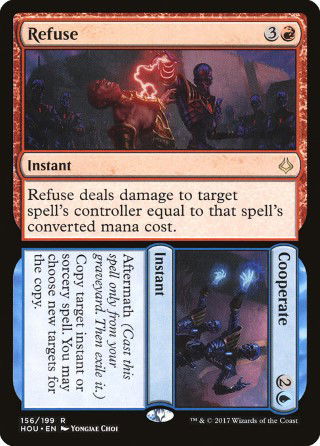
|
|
| PRINTS | USD | EUR | Tix | |
|---|---|---|---|---|
|
|
$0.61 | €0.35 | ||
|
|
$0.30 | €0.13 | 0.02 | |
|
|
||||
|
|
$0.25 | €0.14 | 0.01 |
USD Non-foil
USD Foil
EUR Non-foil
EUR Foil
Languages
| German | ||
| Spanish | ||
| French | ||
| Italian | ||
| Japanese | ||
| Korean | ||
| Portuguese | ||
| Russian | ||
| Chinese | ||
| TraditionalChinese |

